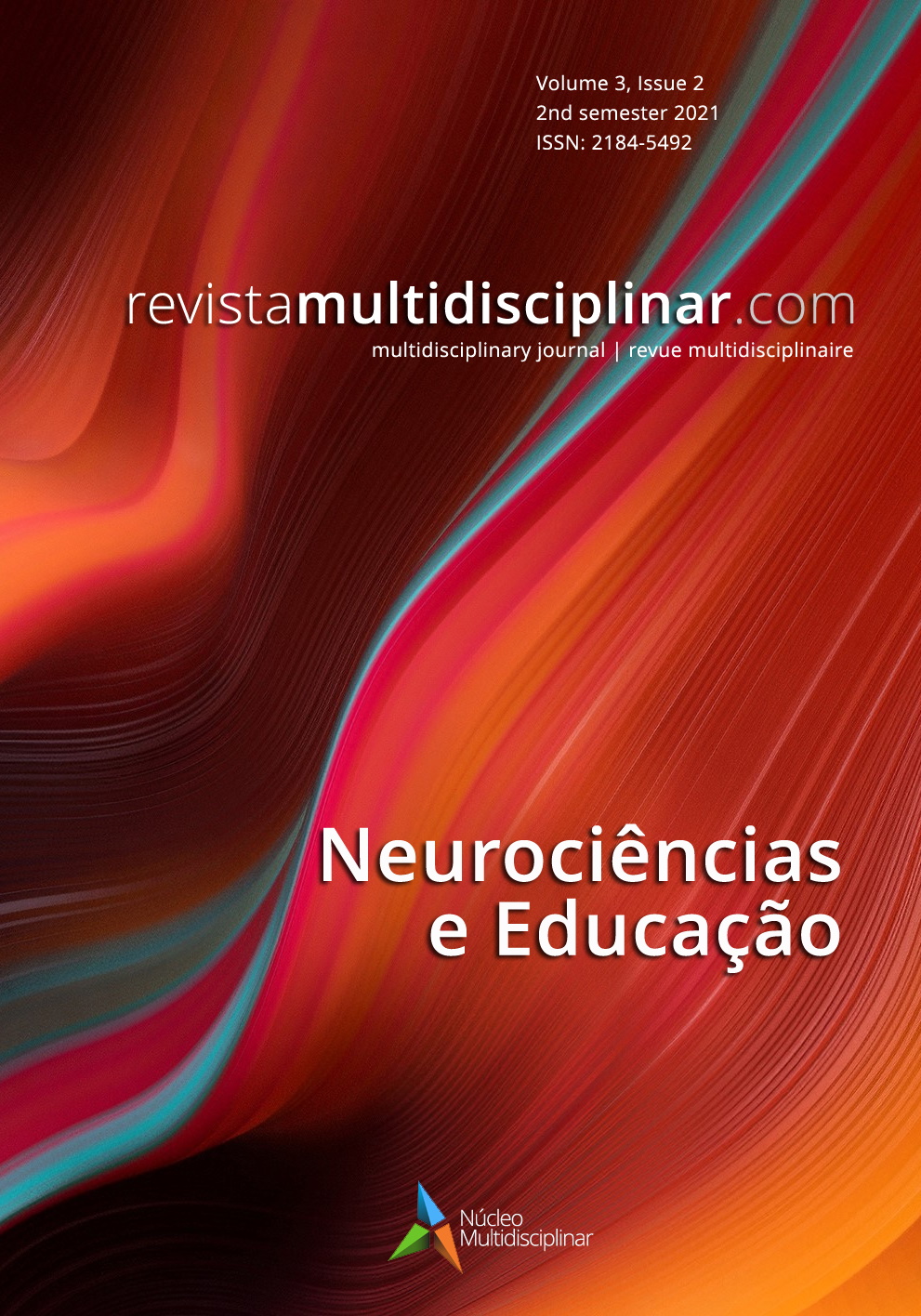Neuronal basis of memory and learning
Comprehension before action
DOI:
https://doi.org/10.23882/NE2148Keywords:
education, learning, neuroscience, memoryAbstract
Neurosciences are an emerging area of scientific knowledge, whose goal is to contribute to a better knowledge of the brain. Due to the complexity of the object of study, it is primarily an interdisciplinary domain, integrating multiple scientific areas, such as biology, chemistry, medicine or psychology. This work results from bibliographic review on the subject of neurosciences and the neurological bases underlying cognitive processes, addressing the processes involved in the construction of memory, learning or attention. It also presents possible bridges between neurosciences and education and neurosciences and artificial intelligence.
References
Ansari, D., & Coch, D. (2006). Bridges over troubled waters: Education and cognitive neuroscience. Trends in cognitive sciences, 10(4), 146-151.
Asok, A., Leroy, F., Rayman, J. B., & Kandel, E. R. (2019). Molecular mechanisms of the memory trace. Trends in neurosciences, 42(1), 14-22.
Basar, E. (2004). Memory and brain dynamics: Oscillations integrating attention, perception, learning, and memory. CRC press.
Bauer, P. J., Dugan, J. A., Varga, N. L., & Riggins, T. (2019). Relations between neural structures and children’s self-derivation of new knowledge through memory integration. Developmental cognitive neuroscience, 36, 100611.
Bear, M., Connors, B., & Paradiso, M. A. (2020). Neuroscience: Exploring the brain. Jones & Bartlett Learning, LLC.
Byrne, J. H. (2017). Learning and memory: a comprehensive reference. Academic Press.
Calafate, L., & Mateus-Pinheiro, A. (2019). Neurogénese em mamíferos adultos-história de uma descoberta revolucionária e sua exploração no ensino das neurociências. In 1. º Congresso Internacional de História da Ciência no Ensino. Universidade do Porto.
Castro-Caldas, A. (2008). Viagem ao Cérebro e a algumas das suas competências. Lisboa: Universidade Católica Editora.
Deng, W., Aimone, J. B., & Gage, F. H. (2010). New neurons and new memories: how does adult hippocampal neurogenesis affect learning and memory?. Nature reviews neuroscience, 11(5), 339-350.
Fischer, K. W. (2009). Mind, brain, and education: building a scientific groundwork for learning and teaching1. Mind, Brain, and Education, 3(1), 3-16.
Gonçalves, L. A., & de Melo, S. R. (2009). A base biológica da atenção. Arquivos de Ciências da Saúde da Unipar, 13(1).
Hassabis, D., Kumaran, D., Summerfield, C., & Botvinick, M. (2017). Neuroscience-inspired artificial intelligence. Neuron, 95(2), 245-258.
Kandel, E. R. (2001). The molecular biology of memory storage: a dialogue between genes and synapses. Science, 294(5544), 1030-1038.
Kandel, E. R. (2007). In search of memory: The emergence of a new science of mind. WW Norton & Company.
Karpicke, J. D. (2017). Retrieval-Based Learning: A Decade of Progress. In Byrne J. H. (Ed.) Learning and Memory: A Comprehensive Reference (pp.487-514). Academic Press.
Karpicke, J. D., & Blunt, J. R. (2011). Retrieval practice produces more learning than elaborative studying with concept mapping. Science, 331(6018), 772-775.
Karpicke, J. D., & Roediger, H. L. (2008). The critical importance of retrieval for learning. Sciense, 319(5865), 966-968.
Posner, M. I., & Rothbart, M. K. (2014). Attention to learning of school subjects. Trends in Neuroscience and Education, 3(1), 14-17.
Posner, M. I., Rothbart, M. K., & Voelker, P. (2016). Developing brain networks of attention. Current opinion in pediatrics, 28(6), 720.
Rato, J. R., Abreu, A. M., & Castro-Caldas, A. (2013). Neuromyths in education: What is fact and what is fiction for Portuguese teachers?. Educational Research, 55(4), 441-453.
Schlichting, M. L., & Preston, A. R. (2015). Memory integration: neural mechanisms and implications for behavior. Current opinion in behavioral sciences, 1, 1-8.
Schlichting, M. L., & Preston, A. R. (2016). Hippocampal–medial prefrontal circuit supports memory updating during learning and post-encoding rest. Neurobiology of learning and memory, 134, 91-106.
Summak, M. S., Summak, A. E. G., & Summak, P. Ş. (2010). Building the connection between mind, brain and educational practice; roadblocks and some prospects. Procedia-Social and Behavioral Sciences, 2(2), 1644-1647.
Tokuhama-Espinosa, T. (2010). Mind, brain, and education science: A comprehensive guide to the new brain-based teaching. WW Norton & Company.
Ullman, S. (2019). Using neuroscience to develop artificial intelligence. Science, 363(6428), 692-693.
Van Kesteren, M. T., Ruiter, D. J., Fernández, G., & Henson, R. N. (2012). How schema and novelty augment memory formation. Trends in neurosciences, 35(4), 211-219.
Downloads
Published
How to Cite
Issue
Section
License
Copyright (c) 2021 Marta Paz, Luís Calafate

This work is licensed under a Creative Commons Attribution-NonCommercial 4.0 International License.









